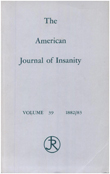Progress toward achieving a common language in psychiatry, II: Results from the international field trials of the ICD-10 diagnostic criteria for research for mental and behavioral disorders
Abstract
OBJECTIVE: In preparing for the publication of ICD-10, the Division of Mental Health of the World Health Organization developed several versions of chapter V, which deals with mental and behavioral disorders. The version for research purposes is called the Diagnostic Criteria for Research (ICD-10 DCR) and gives operational criteria for the diagnosis of mental disorders. This article describes the results of international field trials undertaken to evaluate the draft criteria and refine them further. METHOD: Data were obtained to assess interrater agreement, the confidence with which diagnoses could be made, and the ease of use of the criteria. Additional substudies examined the concordance between ICD-10 DCR, ICD-10 Clinical Descriptions and Diagnostic Guidelines, and other national classification systems (e.g., DSM-IV). The field trials were carried out at 151 clinical centers in 32 countries by 942 clinician/researchers who conducted 11,491 individual assessments of patients. Results for cases assessed by at least two raters are reported here. RESULTS: Most clinician/researchers found the criteria to be explicit and easy to apply. Interrater agreement was high for most diagnostic categories. For some categories, such as those dealing with certain polymorphic psychotic disorders or milder forms of affective disorders, the criteria were rated as somewhat difficult to use, and reliability was lower. Comparison of the results of these field trials with those of the ICD-10 Clinical Descriptions and Diagnostic Guidelines demonstrated that there are increases in interrater agreement when the operational criteria are used. CONCLUSIONS: The use of internationally accepted research criteria enhances the reliability of diagnosis of mental disorders made in research settings worldwide.
Access content
To read the fulltext, please use one of the options below to sign in or purchase access.- Personal login
- Institutional Login
- Sign in via OpenAthens
- Register for access
-
Please login/register if you wish to pair your device and check access availability.
Not a subscriber?
PsychiatryOnline subscription options offer access to the DSM-5 library, books, journals, CME, and patient resources. This all-in-one virtual library provides psychiatrists and mental health professionals with key resources for diagnosis, treatment, research, and professional development.
Need more help? PsychiatryOnline Customer Service may be reached by emailing [email protected] or by calling 800-368-5777 (in the U.S.) or 703-907-7322 (outside the U.S.).



